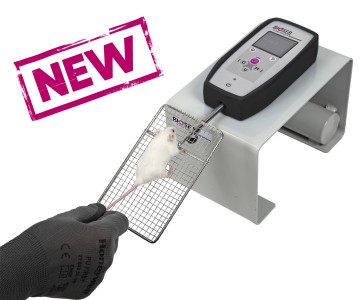Authors
P. Filliat, S. Coubard, C. Pierard, P. Liscia, D. Beracochea et al.
Lab
Centre de Recherches du Service de Santé des Armées “Emile Pardé”, Département de Toxicologie, La Tronche, France.
Journal
NeuroToxicology
Abstract
We investigated the long-term (up to 90 days) consequences of soman intoxication in mice on weight, motor performances (grip strength, rotarod) and mnemonic cognitive processes (T-maze, Morris water maze test). First, a relative weight loss of 20%, measured 3 days after intoxication, was evidenced as a threshold beyond which neuropathological damage was observed in the hippocampus. Animals were then distributed into either low weight loss (LWL) or high weight loss (HWL) groups according to the relative 20% weight loss threshold. Compared to controls, both groups of poisoned mice quickly exhibited a decrease in their motor performance subsequent to an acute soman toxicity phase. Then, total motor recovery occurred for the LWL group. Comparatively, HWL mice showed only transient recovery prior to a second decrease phase due to soman-induced delayed toxicity. One month after intoxication, mnemonic cognitive performances of the LWL group were similar to controls while the HWL group did not exhibit any learning skill. Three months after poisoning, compared to controls, the LWL group showed similar mnemonic performances in the maze test but a mild deficit in the Morris water maze task. At the same time, learning skills slightly recovered in the HWL group. Mnemonic cognitive data are discussed in relation to the neuropathology, neurogenesis and sprouting occurring in the hippocampus of soman-intoxicated animals.
BIOSEB Instruments Used
Grip strength test (BIO-GS3)
Keywords/Topics
Toxicology; Cross-disciplinary subjects
Source :
http://www.sciencedirect.com/science/article/pii/S0161813X06002944

 Pain - Thermal Allodynia / Hyperalgesia
Pain - Thermal Allodynia / Hyperalgesia Pain - Spontaneous Pain - Postural Deficit
Pain - Spontaneous Pain - Postural Deficit Pain - Mechanical Allodynia / Hyperalgesia
Pain - Mechanical Allodynia / Hyperalgesia Learning/Memory - Attention - Addiction
Learning/Memory - Attention - Addiction Physiology & Respiratory Research
Physiology & Respiratory Research











![Dynamic Weight Bearing 2.0 – Postural Module [Add-on]](https://bioseb.com/733-home_default/dynamic-weight-bearing-20-add-on-postural-module.jpg)
























 Pain
Pain Central Nervous System (CNS)
Central Nervous System (CNS) Neurodegeneration
Neurodegeneration Sensory system
Sensory system Motor control
Motor control Mood Disorders
Mood Disorders Other disorders
Other disorders Muscular system
Muscular system Joints
Joints Metabolism
Metabolism Cross-disciplinary subjects
Cross-disciplinary subjects CONFERENCES & MEETINGS
CONFERENCES & MEETINGS 